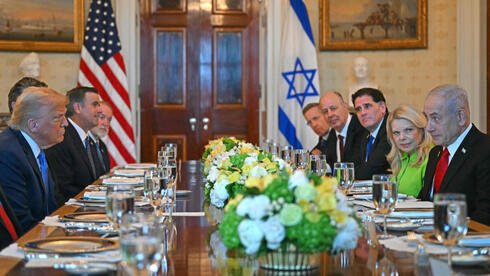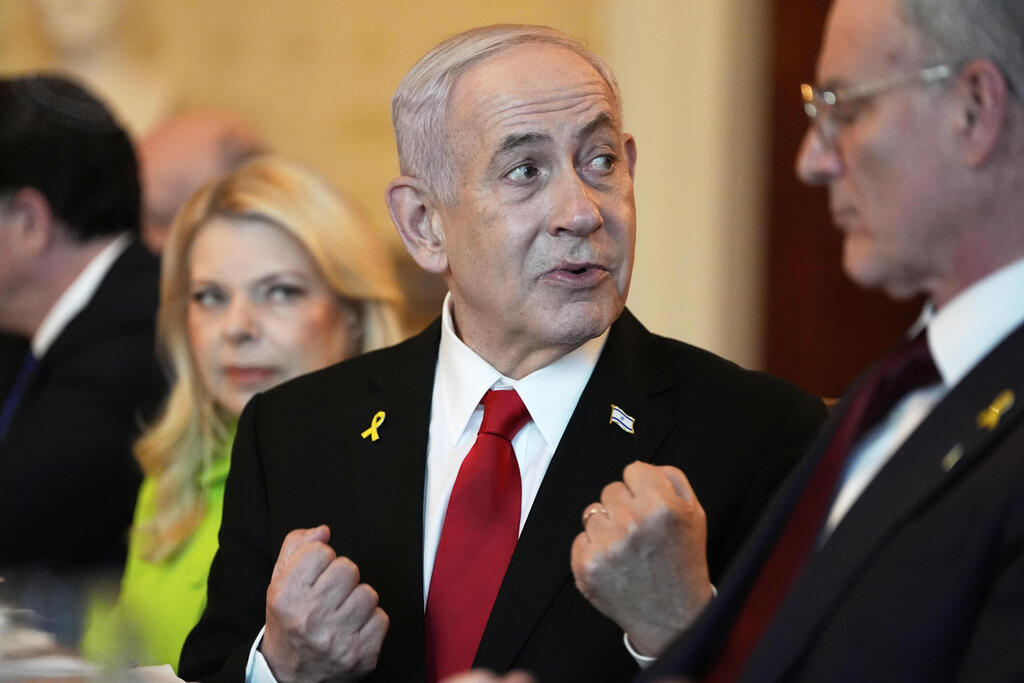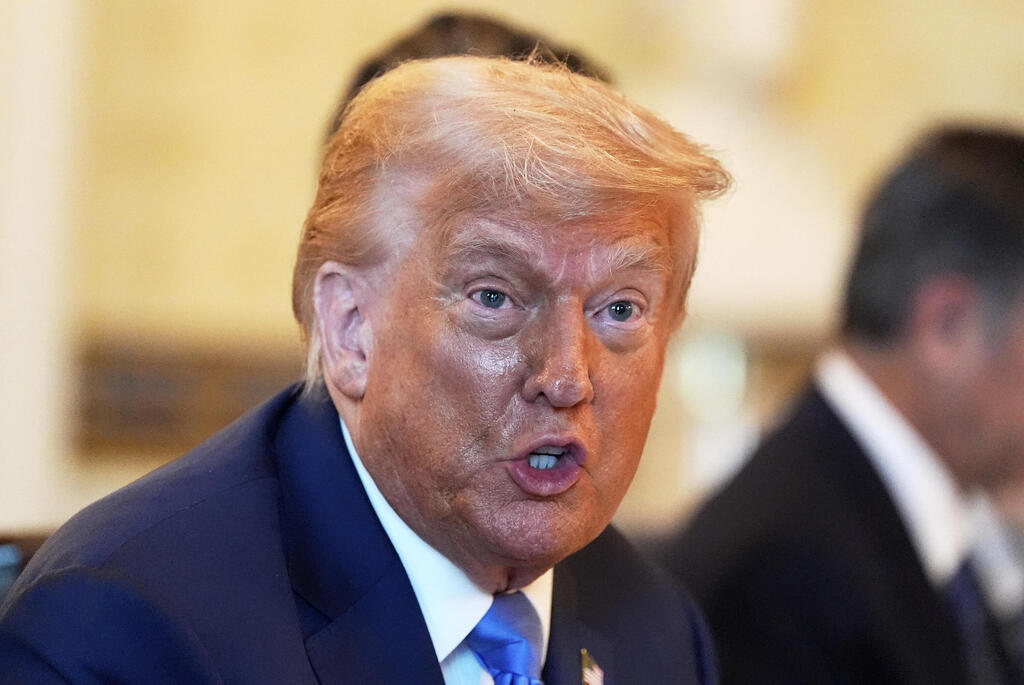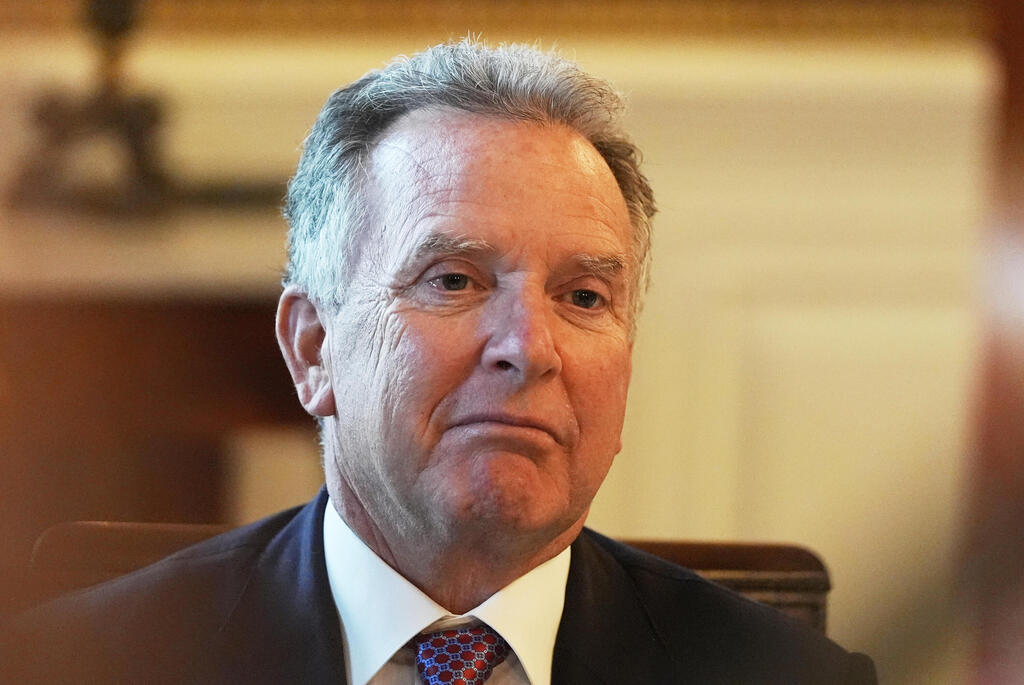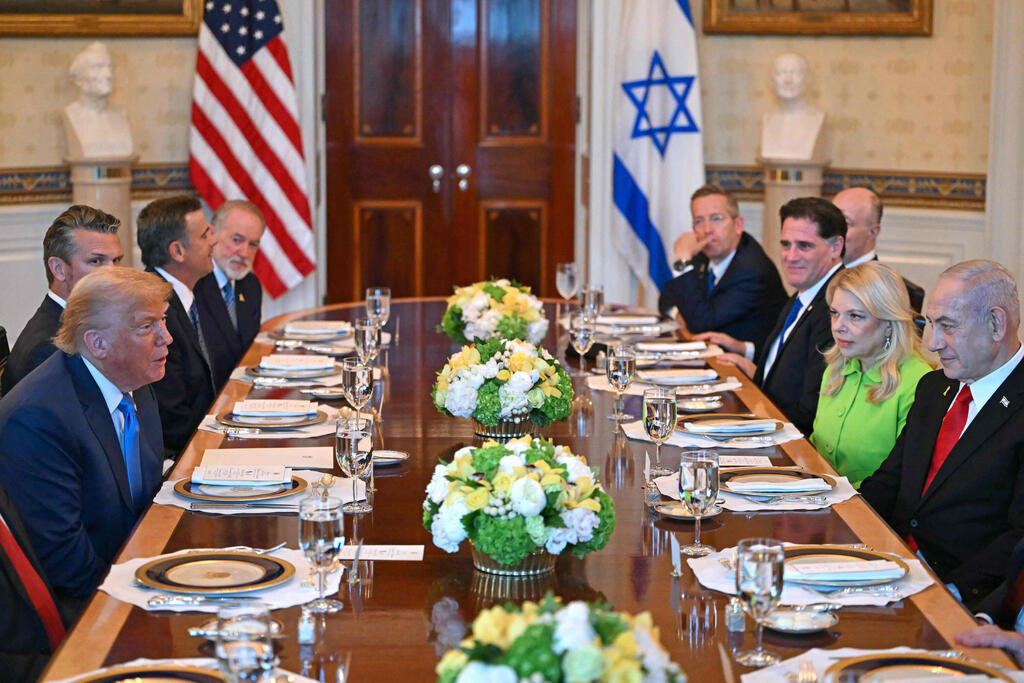The leaders dined together alongside senior Trump administration officials, including Secretary of State Marco Rubio and Secretary of Defense Pete Hegseth, as well as Netanyahu’s delegation and his wife, Sara Netanyahu.
During an informal press event before dinner, Trump praised Netanyahu and Sara Netanyahu as longtime friends, saying, “It’s a great honor to have Bibi and Sara with us. They’ve been friends of mine for a long time. We’ve had lots of successes together, and I think it will only get better in the future. So it’s really nice that you’re at the White House. Great that you’re here with all your fantastic people. We’ve worked together for a long time, and we’ve done a good job together. We’ve had a great time and great results lately, and we expect many more great results, so it’s great to have you here.”
Netanyahu presented Trump with a nomination letter recommending him for the Nobel Peace Prize, praising his leadership: “I would like to express the appreciation and admiration not only of all Israelis but of the Jewish people and many fans around the world for your leadership. Your leadership of the free world, for a just cause, and for striving for peace and security that you are leading in many countries, especially now in the Middle East.”
He added: “We have great opportunities. The president has an exceptional team, and I think our teams together make an exceptional combination to meet challenges and seize opportunities. But the president has already achieved great opportunities—he initiated the Abraham Accords, he is making peace as we speak with country after country. So I want to present to you, Mr. President, the letter I sent to the Nobel Prize Committee. It recommends you for the peace prize you deserve, and you should receive it.” Trump responded: “When it comes from you, it’s very significant.”
When asked about his plan to relocate Palestinians from the Gaza Strip—announced at his first meeting with Netanyahu in February—Trump referred the question to the prime minister. Netanyahu said: “President Trump had a brilliant vision; he called it ‘free choice.’ If people want to stay, they can. But if they want to leave, they should be allowed to. It shouldn’t be a prison; it should be an open place and allow people free choice.”
Netanyahu continued: “We are working closely with the U.S. on finding countries that will implement what they’ve always said—that they want to give Palestinians a better future. I think we’re close to finding some countries, and I think that again gives free choice. Palestinians need that, and I hope we can guarantee that soon.” Trump added: “We’ve had great cooperation from Israel’s neighboring countries, great cooperation from all of them. So something good is going to happen.”
On the two-state solution, Netanyahu said: “I think the Palestinians should have the authority to govern themselves—but not the power to threaten us. That means certain powers, like overall security, will always remain in our hands. That’s a fact, and no one in Israel would agree to anything else. Because we’re not committing suicide; we want to live. We value life—for ourselves and our neighbors. I think we can reach peace between us and the entire Middle East under President Trump’s leadership and cooperation. We can establish a broad peace that includes all our neighbors. We are working toward peace with our Palestinian neighbors—those who don’t want to destroy us. And we’ll make peace where security authorities and sovereign security will always remain with us.”
Trump addressed Iran, saying the U.S. has scheduled talks with Tehran. “We have scheduled talks with Iran—and they want to talk,” he said. “They took a hard hit, in my opinion, when we hit the three nuclear sites. The pilots did an amazing job. There was a lot of fighting, and that operation stopped a lot of it. It’s hard for me to imagine we would want to strike there again, and hard to imagine they would want that. They want to meet; they want to find a resolution. They are very different now than they were two weeks ago. They requested a meeting; I’ll hold it—and if we can put something on paper, that’s good. I think they gained a lot of respect for us, and for Israel too. They want to meet—and we’ll meet.” Witkoff said the meeting could take place as early as next week.
Trump also recounted how Iran notified the U.S. before striking the al-Udeid Air Base in Qatar: “They even asked if we wanted to change the time—that shows respect. I appreciate that. We were not surprised; we evacuated troops from the base in Qatar. They knew it was coming—14 missiles. Iran said: ‘It will happen at one in the morning. Do you want us to delay?’ We said ‘No, one is fine.’ More than 5,000 people left the base; three gunners and three assistants remained— all 14 missiles were intercepted, and that was it.”
Netanyahu called the joint Israel-U.S. operation a “historic victory” that eliminated “two cancerous threats to Israel’s survival—the nuclear threat and the ballistic missile threat.” He said, “Because they planned to build 20,000 such missiles and launch them at a state the size of New Jersey. No country could stand that.”
He added: “So what do you do when two things are going to kill you? You have to remove them. And in a joint effort, we did that. But when you remove a tumor, that doesn’t mean it won’t return. You have to watch and ensure no attempt to bring it back. That was a great accomplishment, and part of the effort is to ensure it doesn’t return—that’s done carefully. Of course the president and I talk about it, our teams talk about it—but there’s no doubt this was a historic victory that changed the Middle East.”
Netanyahu said there is an opportunity to expand the Abraham Accords, “which alone were a historic act worthy of a Nobel Prize for the president. But I believe the opportunities are much greater, and I hope Iran will not test our resolve—because that would be a mistake. Better to choose another path.” When asked if regime change in Iran is necessary, he said, “That depends on the Iranian people.”
Regarding Syria, Netanyahu stated: “I think everyone understands the situation has changed. Previously, Iran effectively ran Syria directly through Hezbollah. Today, Hezbollah is on its knees and Iran is out of the picture. So I think that creates possibilities for stability, security and ultimately peace. I think this was opened also because the president opened a channel; so they have a lot to lose if they return to conflict, and a lot to gain if they move toward peace. And I think that opportunity was opened by the president, also as a result of the changed security situation we brought with the collapse of the Assad regime.”
Trump revealed that Netanyahu had requested lifting sanctions on Syria. “At the request of many countries in the Middle East, including Bibi—we removed the sanctions from Syria,” Trump said. “I met the new leader, and was very impressed by him. Someone told me, ‘He comes from a tough background.’ I replied, ‘Well, that’s not surprising. It’s a tough region of the world.’ But I was truly impressed by him. We removed the sanctions because we wanted to give Syria a chance. They had no chance as long as the sanctions remained.” He added he would consider removing sanctions on Iran “at the right time.”
Before meeting Trump, Netanyahu held talks with Secretary of State Marco Rubio and met with envoy Steve Witkoff and Israeli Minister Ron Dermer.
White House spokeswoman Karoline Leavitt confirmed the Netanyahu-Trump meeting was privately classified as a “dinner” and said Witkoff is expected to travel to Doha for ongoing cease-fire talks. “The president’s top priority in the Middle East is to end the war in Gaza and bring all the hostages home,” she said.
Israeli officials said negotiations are ongoing with mediators and believe a framework deal will require several more days, likely beyond Netanyahu’s Washington visit.
Hamas has raised additional demands, including dismantling the U.S.-backed Gaza Humanitarian Fund, opening the Rafah crossing, and a broader Israeli withdrawal, which Israel rejects. Trump is expected to issue an optimistic statement on ceasefire prospects but not announce an immediate deal.
Domestically, Netanyahu faces pressure from hardline ministers Bezalel Smotrich and Itamar Ben-Gvir opposing concessions but remains determined to reach terms focusing on Gaza’s demilitarization and exile of Hamas leadership. Netanyahu said he expects to coordinate closely with Trump to finalize conditions to end the fighting.



